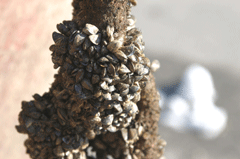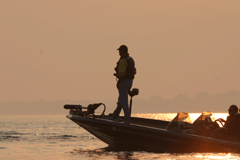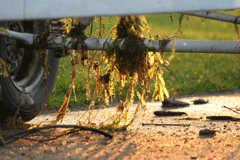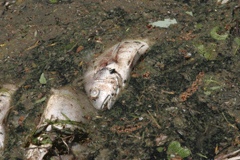Rock the Boat
Air Date: Week of May 15, 2009

Invasive Zebra muscles aggressively attach themselves to anchors.
Wisconsin is fighting the spread of aliens in their water with the power of rock and roll. Bret Shaw, an environmental communications director at the University of Wisconsin, tells host Jeff Young about a band of inspired musician-anglers helping “reel” in the spread of aquatic invasive species.
Transcript
YOUNG: With summer coming the fish are jumping.
And wildlife experts hope fishermen will help out with a “reel” big problem—the spread of aquatic invasive species. It just a takes a few simple precautions to keep unwanted critters and diseases out.

There's nothing quite like a sunset over a clean Wisconsin lake.
MUSIC: “Inspect my boat. Remove all plants, mud and critters. Drain my bilge and my life wells and motors. Toss my bate that I don’t want in the trash. And when I roll back home I rinse my boat or just let it dry naturally. And these simple steps will keep Wisconsin waters pure and clean. Everybody! Inspect my boat.”
YOUNG: [Singing] Inspect my boat. Remove all plants, mud and critters. Drain my bilge … You know I’ve gotta says that’s the first time I’ve heard the word bilge in a non-pirate song. So I really like that.

Fishermen are urged to clean their boats to keep the waters clean.
YOUNG: Tell me about this song. What’s the goal here?
SHAW: Well the basic goal here is we are primarily targeting 35 to 55 year old fishermen who are most likely to move their boats and trailers from lake to lake and body of water to body of water. So what we looked at was what different types of music do men – which by the way, I am a 41 year old fisherman myself – but what types of music do they listen to. So what I teach is social marketing type activities, so I knew from research that music can, you know, affect our memory, our attitudes, our behaviors. Why not combine all these different contexts and interests to spread the message about preventing the spread of aquatic invasive species.
YOUNG: So you have one tune here that is about stopping this spread of disease. It’s called “One Bait, One Lake.”
SHAW: Right. The story behind that song… we were doing some message testing at the Madison Fishing Expo, ‘cause we wanted to sort of pass some different advertising ideas by about how actual fishermen wanted to hear about these different messages. And so we were talking to this one fisherman and the expo and we were chatting with him about viral hemorrhagic septicemia, a long word – VHS, and we do have some of it in the state. It affects their immune systems and they actually bleed internally. So he just stood there and he said “you know what? I get it. It’s really simple. One bait, one lake.”

Fish infected by viral hemorrhagic septicemia.
YOUNG: Now you’ve got folk rock. You’ve got a rockabilly tune. You’ve got a pretty straight forward rock/pop kind of thing. But what about, you know, if I’m a fisherman and I like, I don’t know, gangster rap or speed metal. Have you considered ….
[LAUGHING]
YOUNG: … how are you going to reach out to me?
SHAW: Well, you know, one – we are looking at how to communicate more effectively with younger adults. And so this was just sort of an experimental project. So if we get demand for different genres of music certainly we’ll pursue those. As far as gangster rap, I don’t know that’s our demographic here in northern Wisconsin.
[LAUGHING]
SHAW: … but it’s a good idea.
YOUNG: So no D.J. Zebco spinning the reels or anything like that for now.
[LAUGHING]
YOUNG: Now this is a light hearted way to approach this and obviously we’ve been having some fun with it, but underneath all this – this is serious stuff we’re talking about. I mean the threat you guys face from these invasives and diseases – this is serious business.

Bret Shaw

Invasive Zebra muscles aggressively attach themselves to anchors.
SHAW: Thank you.
MUSIC: “Clean boats. Clean waters for the future of our lakes. Clean boats. Clean water. A few steps is all it takes to keep our waters clean. Clean your boat every day when you take out a fishin’, when you take it out to play. Talking aquatic invasive species prevention.
[MUSIC: Brett Shaw “Ballad Of AIV”, “One Bait, One Lake”, “Clean Boat, Clean Water” (http://www.uwex.edu/erc/music/)]
CURWOOD: Just ahead – the tale of some tough girls – down Mexico way. Stay with us - on Living on Earth.
ANNOUNCER: Support for the environmental health desk at Living on Earth comes from the Cedar Tree Foundation. Support also comes from the Richard and Rhoda Goldman Fund for coverage of population and the environment. And from Gillman Ordway for coverage of conservation and environmental change.
This is Living on Earth on PRI, Public Radio International.
Links
Living on Earth wants to hear from you!
Living on Earth
62 Calef Highway, Suite 212
Lee, NH 03861
Telephone: 617-287-4121
E-mail: comments@loe.org
Newsletter [Click here]
Donate to Living on Earth!
Living on Earth is an independent media program and relies entirely on contributions from listeners and institutions supporting public service. Please donate now to preserve an independent environmental voice.
NewsletterLiving on Earth offers a weekly delivery of the show's rundown to your mailbox. Sign up for our newsletter today!
 Sailors For The Sea: Be the change you want to sea.
Sailors For The Sea: Be the change you want to sea.
 The Grantham Foundation for the Protection of the Environment: Committed to protecting and improving the health of the global environment.
The Grantham Foundation for the Protection of the Environment: Committed to protecting and improving the health of the global environment.
 Contribute to Living on Earth and receive, as our gift to you, an archival print of one of Mark Seth Lender's extraordinary wildlife photographs. Follow the link to see Mark's current collection of photographs.
Contribute to Living on Earth and receive, as our gift to you, an archival print of one of Mark Seth Lender's extraordinary wildlife photographs. Follow the link to see Mark's current collection of photographs.
 Buy a signed copy of Mark Seth Lender's book Smeagull the Seagull & support Living on Earth
Buy a signed copy of Mark Seth Lender's book Smeagull the Seagull & support Living on Earth

